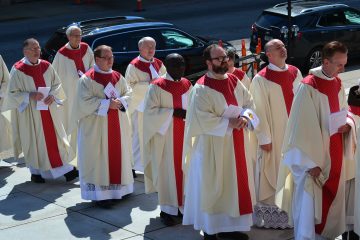Keeping the Body with Holiness and Reverence: Part 1
Note: This article is part of an ongoing series on Pope St. John Paul II’s “Theology of the Body” (TOB).
Christ brought the Old Law to fulfillment through His example and teaching. Rather than focus exclusively on mere exterior conformity to the moral law, He emphasized conversion of heart, for it is out of the heart that our intentions and actions flow. According to Pope St. John Paul II, “Christ sees in the heart, in man’s innermost [being], the well-spring of purity– but also moral impurity” (TOB 50.2). Thus, Jesus calls us to purity of heart, which encompasses our entire moral life: “Every moral good is a manifestation of purity, and every moral evil a manifestation of impurity” (TOB 50.4).
The pope deepens our understanding of “purity of heart” by appealing to St. Paul’s teaching on “life according to the Spirit,” which is characterized by “the fruit of the Spirit”: “love, joy, peace, patience, kindness, goodness, faithfulness, gentleness, self-control” (Gal. 5:22-23). John Paul II saw each of these fruits as a moral virtue behind which “stands a specific choice, that is, an effort of the will, a fruit of the human spirit permeated by the Spirit of God, which manifests itself in choosing the good” (TOB 51.6). In other words, the fruits of the Spirit become manifest in us through our free cooperation with the Holy Spirit whom Christ has poured into our hearts. The more we align our wills with the Holy Spirit and grow in intimacy with Him, the more we reject the works of the flesh (Gal. 5:19-21; Mk. 7:21-22) and come to manifest more and more the fruits of the Spirit, which are concrete expressions of the purity of heart to which Christ calls us.
John Paul II refers to this purity as an “ability,” an “attitude” and therefore a “virtue”; that is, “a practical ability that enables man to act in a definite way and at the same time not to act in a contrary way” (TOB 54.2). As a virtue, “Purity must obviously take root in the will, in the very foundation of man’s conscious acting” (TOB 54.2), but it is also—and most fundamentally— the Holy Spirit working in the person’s heart such that St. Paul “considers purity not only as an ability (or aptitude) of man’s subjective faculties, but at the same time as a concrete manifestation of life ‘according to the Spirit’” (TOB 54.4).
Importantly, as mentioned last month, St. Paul expressed that purity of heart has two dimensions. “For this is the will of God, your sanctification: that you abstain from unchastity; that each one of you knows how to keep his own body with holiness and reverence, not as the object of lustful passions” (1 Thess. 4:3-5). For John Paul II, “The task of purity… is not only… abstaining from ‘unchastity’ and from what leads to it, that is, abstaining from ‘lustful passions,’ but, at the same time, keeping one’s body, and indirectly that of the other, in ‘holiness and reverence.’ . . . These two functions, ‘abstaining’ and ‘keeping,’ are strictly connected and dependent on each other” for it is “impossible to ‘keep the body with holiness and reverence’ without this abstinence ‘from unchastity.’” Similarly, “Keeping the body with holiness and reverence… gives an appropriate meaning and value to this abstinence” (TOB 54.3).
For John Paul II, “The reverence born in man for everything bodily and sexual, both in himself and in every other human being, male and female, turns out to be the most essential power for keeping the body ‘with holiness’” (TOB 54.4). He refers to this reverence “as a power belonging to the spiritual order,” and goes on to say that “it is precisely this interior power that gives full dimension to purity as a virtue” (TOB 54.4).
But what exactly is this reverence for the body, and how do we cultivate it? To answer these questions, the saintly pope revisits the original experiences and lifts up an often-overlooked gift of the Holy Spirit. We will delve into these reflections next time.
 Dr. Andrew Sodergren, MTS, PSY.D. is a Catholic psychologist and director of psychological services for Ruah Woods. He speaks on the integration of psychology and the Catholic faith. He and his wife, Ellie, have five children.
Dr. Andrew Sodergren, MTS, PSY.D. is a Catholic psychologist and director of psychological services for Ruah Woods. He speaks on the integration of psychology and the Catholic faith. He and his wife, Ellie, have five children.
This article appeared in the July 2024 edition of The Catholic Telegraph Magazine. For your complimentary subscription, click here.














